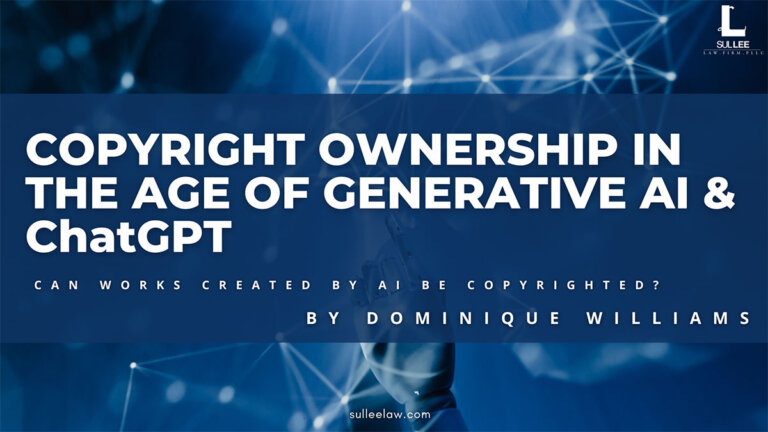Copyright is a type of intellectual property that protects original works of authorship as soon as an author fixes the work in a tangible form of expression. Copyright protects a variety of artistic works, such as: (1) literary works; (2) musical works; (3) dramatic works; (4) pantomimes and choreographic works; (5) pictorial, graphic, and sculptural works; (6) motion pictures and other audiovisual works; (7) sound recordings; and (8) architectural works. 17 U.S.C. § 102(a).
Generally, to be eligible for copyright protection, the work must be an original work of authorship that was created by a human author. Copyright law serves the purpose of protecting “the fruits of intellectual labor” that are founded in the “creative powers of the mind.” Trade-Marks Cases, 100 U.S. 82, 94 (1879). As such, copyright registration will not be issued if the work is created by a non-human author. Burrow-Giles Lithographic Co. v. Sarony, 111 U.S. 53, 58 (1884).
However, copyright requirements have been placed under a microscope due to the ubiquity of generative AI programs, such as ChatGPT, which can create data, such as images, videos, audio, text, and 3D models based on human prompts. The widespread use of this generative artificial intelligence, by both individuals and businesses, has presented the United States Copyright Office with a novel and complex legal issue regarding the copyrightability of such outputs. For example, if a human author provides the parameters to generative AI, which then generates an output based off these parameters, does the output constitute copyrightable matter? Does providing limited parameters constitute sufficient human creation to warrant copyright protection? Should a human author provide more than surface level prompts to gain copyright registration? How much involvement by AI is too much involvement to warrant a refusal of registration?
When ChatGPT was made available to the public, I rushed to give it a try, to see just how sophisticated the generative AI was. First, I entered a simple prompt into the software – “write me a short story about a family visiting New Orleans for the first time.” Within a matter of seconds, it drafted the following short story:
“Once upon a time, there was a family of four who had never been to New Orleans. They had heard so much about the city’s rich culture, music, and food, and decided to plan a trip to experience it for themselves. As they arrived in the city, they immediately felt the energy and vibrancy of the place.
The streets were alive with music, and the smells of delicious Cajun and Creole cuisine wafted through the air. Their first stop was the French Quarter, where they explored the colorful architecture and unique shops. They sampled some of the famous beignets from Café du Monde and listened to a street performer play jazz music on his trumpet.
The family then decided to take a riverboat tour down the Mississippi River, learning about the city’s history and landmarks along the way. They saw the St. Louis Cathedral, the Garden District, and the famous steamboat Natchez. At night, they wandered through the streets of the French Quarter, taking in the lively atmosphere and indulging in more delicious food. They even tried alligator for the first time!
On their last day, the family visited the National World War II Museum, learning about the city’s important role in the war effort. They also visited the famous Mardi Gras World, where they got a behind-the-scenes look at the elaborate floats and costumes used in the annual celebration. As they packed their bags to leave, the family felt grateful for the amazing memories they had made in New Orleans. They had truly fallen in love with the city’s unique culture and friendly people, and promised to come back again someday.”
Next, I altered the prompt slightly, asking it to generate a funny story about a family’s first visit to New Orleans. Again, within a matter of seconds, based on my simple parameters, ChatGPT generated a story, detailing the family’s funny experiences and mishaps on their first time visit to New Orleans. I experimented with the technology further, asking it to write me a love song. Immediately, the technology created a song, consisting of two verses, a chorus, a pre-chorus, and a bridge.
After exploring ChatGPT and gaining an understanding of how the technology worked, I remember having a conversation about it with a friend who joked that she would write a book using the technology and copyright and sell the book. I remember telling her that I don’t think that a work generated by ChatGPT would be eligible for copyright protection, because it doesn’t have sufficient human authorship. Specifically, I noted that providing simple parameters and allowing AI to generate the substantive details would likely not satisfy the original work of human authorship threshold.
On March 16, 2023, the United States Copyright Office issued some guidance on the copyrightability of works containing material generated by artificial intelligence. The Copyright Office’s guidance provided the following takeways:
To satisfy the threshold of copyrightabilty, the work must be created by a human author. That means that AI-generated by AI that is merely a result of mechanical reproduction is not copyrightable. Rather, the work must include the owner’s own original mental conception.
The Office further explained that if a work’s “traditional elements of authorship” were generated by a machine, for example, by providing a prompt and letting the AI generate the output, the Copyright Office will refuse registration, because there was no creative control by the human user. Mere influence of the AI’s outputs is insufficient to acquire copyright protection.
The Office’s guidance means that works generated by AI may be eligible for copyright protection, if the author provided original elements into the generative software, thereby playing a significant role in the output. However, works that are merely derived by entering general parameters into a generative AI software, much like the ones generated in my above examples, would not be eligible for copyright protection.
